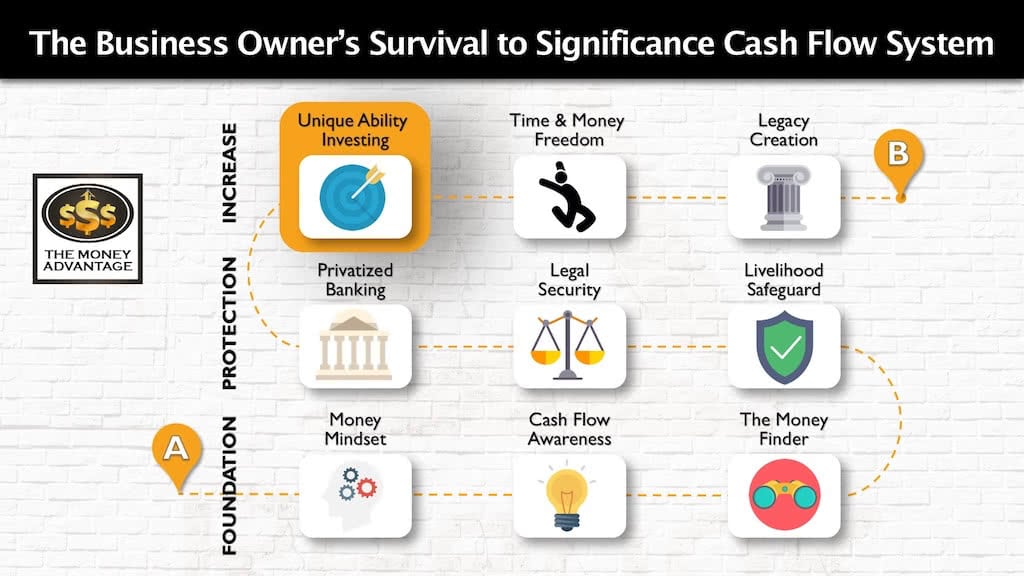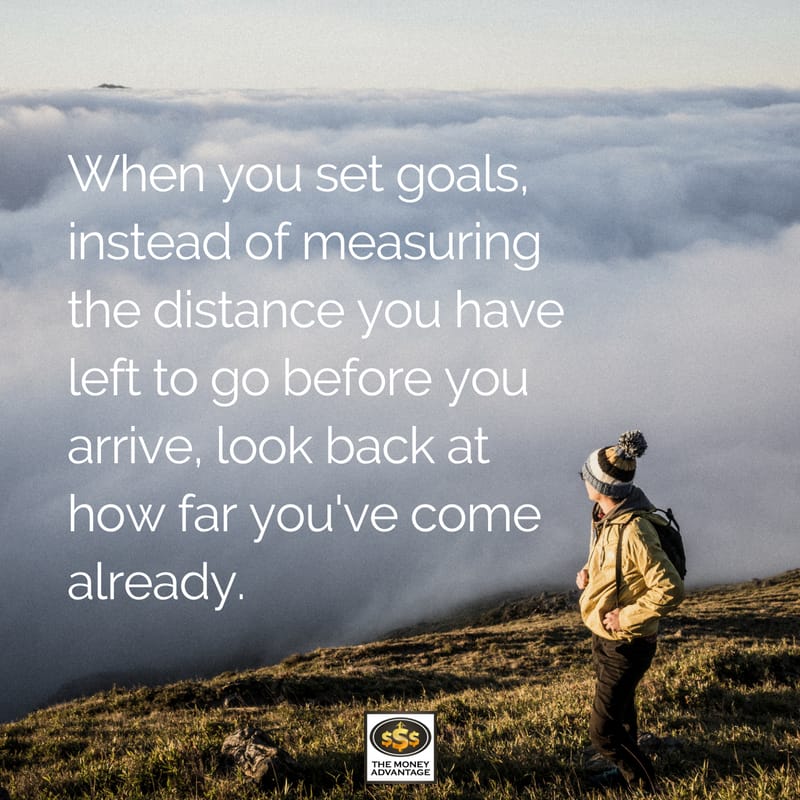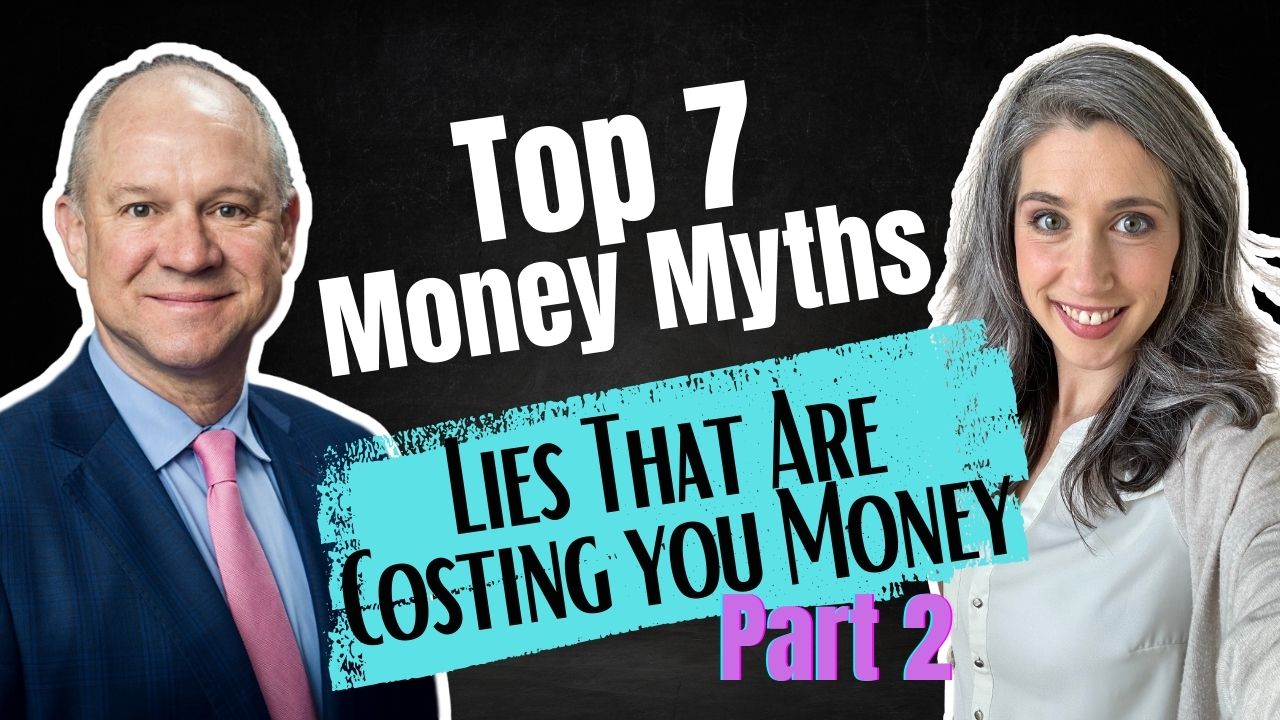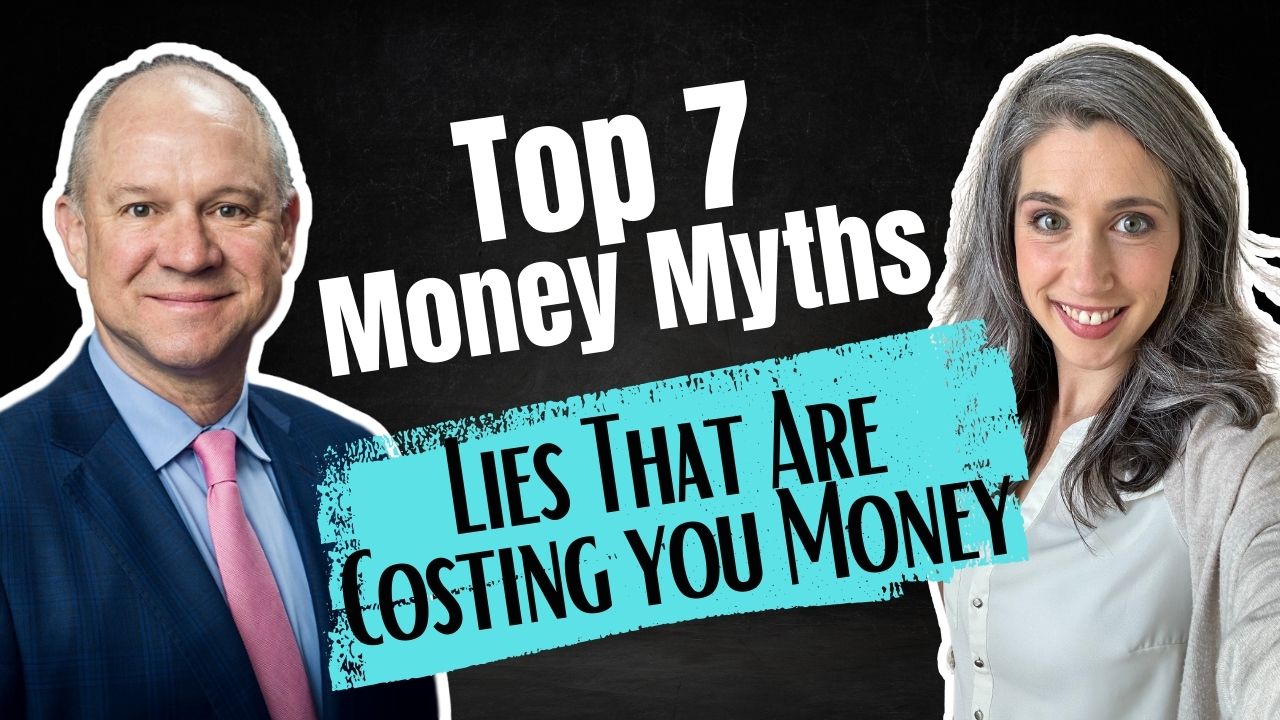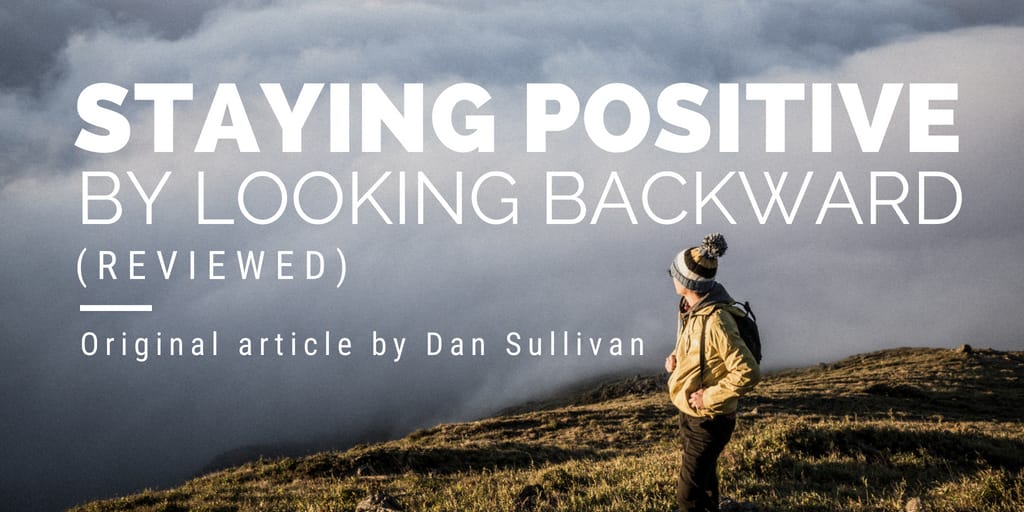
Staying Positive by Looking Backward (Reviewed)
Dan Sullivan shares a profound perspective on goal-setting, exponential vision, and staying energized to continue progressing, in his article Staying Positive by Looking Backward.
We’re sharing this article, along with our experience of using these concepts, to help fortify your abundance mindset. We know that developing a healthy, positive perspective is the secret weapon of the entrepreneur. It energizes and encourages you, helping you build the life and business you love.
Podcast: Play in new window | Download (Duration: 21:48 — 20.0MB)
Subscribe: Apple Podcasts | Spotify | Android | Pandora | RSS | More
Table of contents
Where Entrepreneurship Fits into the Cash Flow System
We love Entrepreneurship. Business owners emphasize and focus on cash flow over accumulation.
In the Cash Flow System, you first increase cash flow by keeping more of the money you make. Then you protect your money. Finally, you increase and make more.
Entrepreneurship is part of Investing in stage 3. Building a cash-flowing asset portfolio of real estate and business accelerates time and money freedom.
Introduction to Dan Sullivan and Strategic Coach
[2:14 – Bruce] Dan Sullivan has been coaching entrepreneurs since 1979. He says that you need to work on your business, not just in your business.
Dan is a master thinker in thinking about your thinking.
Looking backward is a way to not only think about your life and what you want to achieve but why you think about things in a certain way and how you want to achieve them.
The 10 Times Multiplier
[3:15 – Bruce] Dan is a big believer in what he calls the 10 times multiplier. He says that you grow exponentially when you look backward. Looking backward allows you to see how you were at one point, brings you clarity, and helps you move forward.
You might be thinking that there’s no way you can 10 times your income. Maybe you’re already making, let’s just say $200,000, and you don’t see the way to get to the $2 million mark. He says to think back to when you were only making $20,000. You increased your income 10 times, from $20K to $200K. You can use that same growth pattern to 10 times your income from $200K to $2M.
Why Looking Backward Helps You Stay Positive
[4:25 – Rachel] When you set goals, instead of measuring the distance you have left to go before you arrive, look back at how far you’ve come.
Looking forward to how far you still have yet to go, can be really discouraging. But when we look backward, we realize that we’ve done a lot already.
That same person that we were that created that progress and advancement in the past is the same person that we are now who will carry that advancement and progress forward.
25-Year Vision, 90-Day Goals
[5:12 – Bruce] Dan always says, have a 25-year vision, which some people would call a goal, but then look at it in 90-day increments.
You’re constantly looking at what you have achieved in the past 90 days, and that helps you stay motivated. If you look forward, think about how much further you have until the goal, that demotivates and discourages you, and you get down on yourself. But if you look at just 90 days, you’ll see what you accomplished in 90 days.
80% Perfect
[5:50 – Bruce] Dan also has an 80% rule, where he says to get something 80% done, and then pass it on to somebody else. And then when they do it 80% of the way, all of a sudden, the project is 96% done.
This keeps you motivated by also having fresh things to do, instead of trying to perfect that 80%.
Goal-Setting
[6:10 – Bruce] You have to set achievable goals, but your goals also have to be measurable. There’s not a right way or wrong way to set goals and to measure your progress.
If you only use the ideal as your goal, you’re going to set yourself up for disappointment. Instead, use the ideal as a vision.
Have a 25-year vision of a bigger and better future, but set goals every 90 days for what you can actually achieve.
The key to staying positive, inspired and motivated is looking backward. It can inspire you to stay motivated in going forward.
A Continually-Growing Vision
[08:18 – Rachel] As entrepreneurs, we move forward and check one thing off the to-do list. Then, all of a sudden, you have this bigger, better future that you’re reaching for.
That 25-year vision is a moving target out there that has expanded, and it’s even bigger than it was before. And that’s good, amazing in fact, that we have this ability to be flexible and continue to expand as we grow.
But at the same time, that means we’ll never reach that vision because, by the time we get there, we’re going to have a bigger vision.
Action-Oriented Goals, Not Results-Oriented Goals
[9:00 – Rachel] I remember when I first started in business, I had a goal to make $100,000 in the first three months.
And that does not usually happen when you start a business, and it certainly did not happen for us. Our income was significantly lower than that. And we had to decide if we should even continue moving forward in business.
I realized that instead of having a results-based goal, like a dollar amount of income, I needed to have my goal be something I could control. I changed my perspective. Instead of having the outcome be my goal, I set a goal that was an action that I do.
I’m not in control of the dollar amount that comes in, but I am in control of the value that I provide and what I create.
So instead of a goal to make X, I set action-oriented goals for what I will do.
Why Numerical Goals Are Limiting
[10:25 – Bruce] I just want to make this very clear, Dan has never said this that I know of, but I’ve heard other people say that goals in the form of a number are limiting.
Human nature will say, “I’m going to make $100,000 in the first three months of business.” And you do it.
Suddenly, human nature takes over and says, “Well, I don’t have to do anything for the next two or three months. Because, you know, I reached my goal.”
Instead, if you have a vision, you say: “I’m going to continue to add value into people’s lives, and I’m going to grow my business and bring as many people on as possible.”
Goals can be very, very limiting.
The Four Benefits of Looking Backward Instead of Forward
1) You Have a Sense of Accomplishment
You gain a real sense of accomplishment that keeps you in the positive zone and appreciating your actual achievements and improvements rather than perpetually striving for unachievable perfection.
2) You Have A New Way of Viewing Your Past
You acquire the ability to look at your past achievements through a new lens and appreciate the real progress you made and goals you achieved. Past progress that may have seemed disappointing to you when you were measuring forward instead of backward is now transformed in your mind so you can see your achievements more clearly, giving you renewed confidence now.
[13:05 – Bruce] There’s never failure. Instead, you’re increasing your capabilities.
You may have heard that there’s no failure, just feedback. Well, what do you do with that feedback? You increase your capability to handle that situation in the future or think of different ways to solve a particular problem.
[14:35 – Rachel] If you had a goal to make a million dollars, but instead, you only made $700,000, that’s 700,000 more than you probably would have made if you had no goal at all. Instead, look back and say, “That’s $700,000 of progress!” You may have failed to meet the marker that you put in place, but you didn’t fail because you had all that growth in the process.
3) You Increase Your Confidence
This renewed confidence from knowing that you made progress in the past has you staying positive and optimistic that you can do it again in the future and achieve even bigger goals, especially now that you know how to measure properly going forward.
[15:50 – Rachel] I love the idea that who I am, as a person, progresses. Therefore, I am a person who progresses. It’s who I am. My nature is to progress. Then as I move into the future, I will continue to progress. That’s a powerful perspective for being able to achieve anything in the future.
4) You Have a Strategy for Setting Goals
You have a new understanding of the purpose of your ideals and how to use them to illuminate your path and set achievable goals. Your ideals can keep growing and get even more exciting and motivating, allowing you to set even bigger goals in the future.
[17:10 – Rachel] Having a big vision is something that motivates and compels you. It’s a reason to wake up in the morning. It’s a purpose in life. If your vision for your life was just to be a minuscule bit better than you are today, that could potentially produce complacency.
For me, that’s not as exciting. I love the excitement of having a big vision.
Flip the Switch to Stay Positive
And if you find yourself striving after ideals or getting in a negative zone by looking at how far you have left to go to achieve your vision, just remind yourself to flip the switch. It’s a mindset shift that takes practice but in time will become a habit.
[18:15 – Bruce] If you surround yourself with this positive thinking, and you listen to how other people have moved forward with their businesses, you will create a 25-year vision, and be able to move forward by looking backward.
[19:30 – Rachel] Think about your vision. Is it bigger than your current reality? Use this to help you stay positive and motivated.
A Financial Axle to Support Your 10 Times Life Vision
If you would like to secure a financial axle that will bear
We’ll help you strategically create certainty and stability so that no matter what happens in your life, you will transcend your current life circumstances.
Go out there and do great things. Expand your vision and stay positive by looking backward.
Success leaves clues. Model the successful few, not the crowd, and build a life and business you love.
Becoming Your Own Banker, Part 27: 7 Money Myths that are Costing You, Continued
Is what you think about money actually true? Is it helping or hurting you? Moving you forward and expanding your influence, or limiting you and your potential? If you joined us last week, you know that in true Bruce and Rachel fashion, we only covered half of our intended conversation, so we’re back to reveal…
Read MoreBecoming Your Own Banker, Part 26: Top 7 Money Myths, Lies That Are Costing You Money
What if what you think about money turned out not to be true? Even worse, what if you’re believing lies that are costing you money? Embark on a journey as we unravel the twisted web of money myths holding you back from true wealth. Inspired by Nelson Nash and flavored with insights from David Stearns,…
Read More
